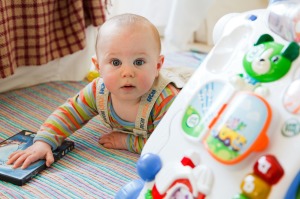 As a parent, experiencing your baby’s first crawl, first steps and first words are moments that you will cherish forever. It is an exciting time for both you and your baby. Somewhere between all of those firsts, your baby’s teeth will make their grand entrance.
As a parent, experiencing your baby’s first crawl, first steps and first words are moments that you will cherish forever. It is an exciting time for both you and your baby. Somewhere between all of those firsts, your baby’s teeth will make their grand entrance.
Here are some things that you should know about your baby’s first teeth.
What to Expect
Somewhere between 3 and 12 months, your baby will show signs that might suggest his or her first teeth are about to grow in. These common teething symptoms include:
- Drooling
- Biting
- Irritability
- Crying
- Refusal to feed
The type of symptoms and the severity varies from baby to baby. Your baby might experience little discomfort or he or she might be shedding big time tears. However, you can expect to see at least some, or many of these symptoms.
Teething Tips
While you cannot take away your baby’s teething discomfort, you can still make the process easier with these teething tips:
- Refrigerate teething toys or wet washcloths – Chewing relieves the aching pressure of new teeth pushing out from your baby’s gum. The cold chewing toys or wet washcloths will numb your baby’s gums.
- Clean your baby’s teeth – Using your clean finger, a soft washcloth or a soft, wet toothbrush without toothpaste to clean your baby’s teeth and gums can provide soothing to his or her discomfort.
- Feed your baby cold food – With adult supervision, you can feed your baby ice chips, yogurt or cold blended fruits to help ease aching gums.
Once your baby’s teeth have settled in, it is important to care for them. You could try using a toothbrush with two or three rows of very soft bristles or a soft, moistened washcloth. Gently clean your baby’s teeth once in the morning and once at night to help make it a habit for your child. Do not use toothpaste until you have consulted your dentist.
RELATED: Why Kids Need to Practice Good Oral Hygiene Early
What Not to Do
During teething, you should avoid using numbing agents. Rubbing alcohol and natural teething medicines including herbal or homeopathic can put your baby at risk for reduced oxygen levels in the blood. It can also cause heart problems and drowsiness. Additionally, you should avoid amber teething necklaces. They do not work and they are a choking hazard.
Let Duffield Dentistry Care for Your Baby’s Teeth
At Duffield Dentistry, we understand that your baby’s teeth are just as important as yours. In fact, we want to provide your baby with the best dental care at an early age to prevent future oral health problems. Contact us today at 877-630-7410 and let us teach you how to properly clean your baby’s first teeth.

